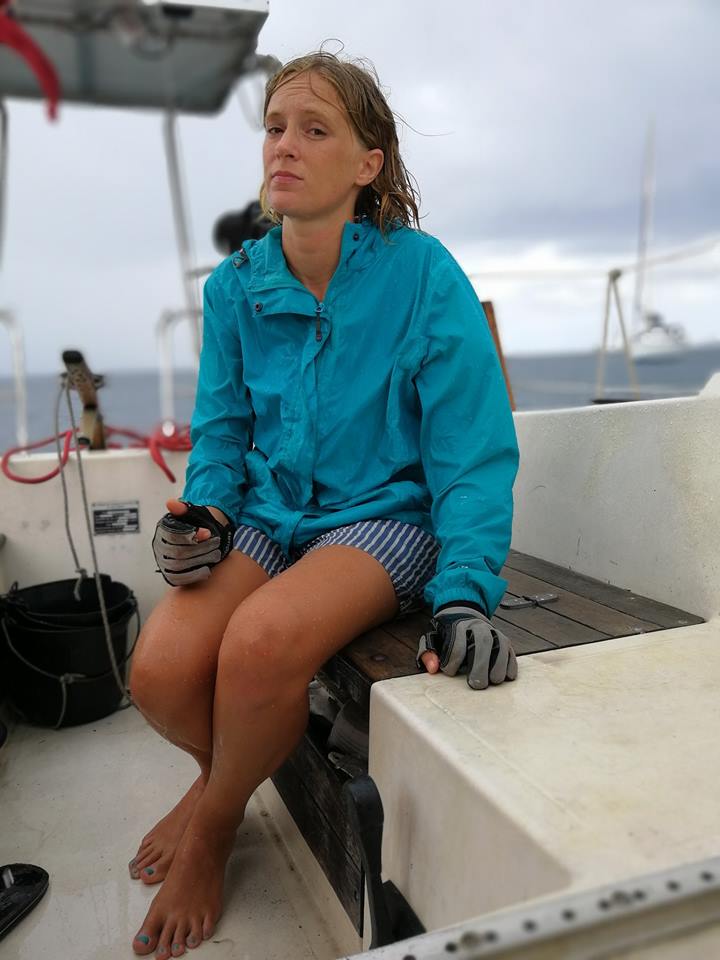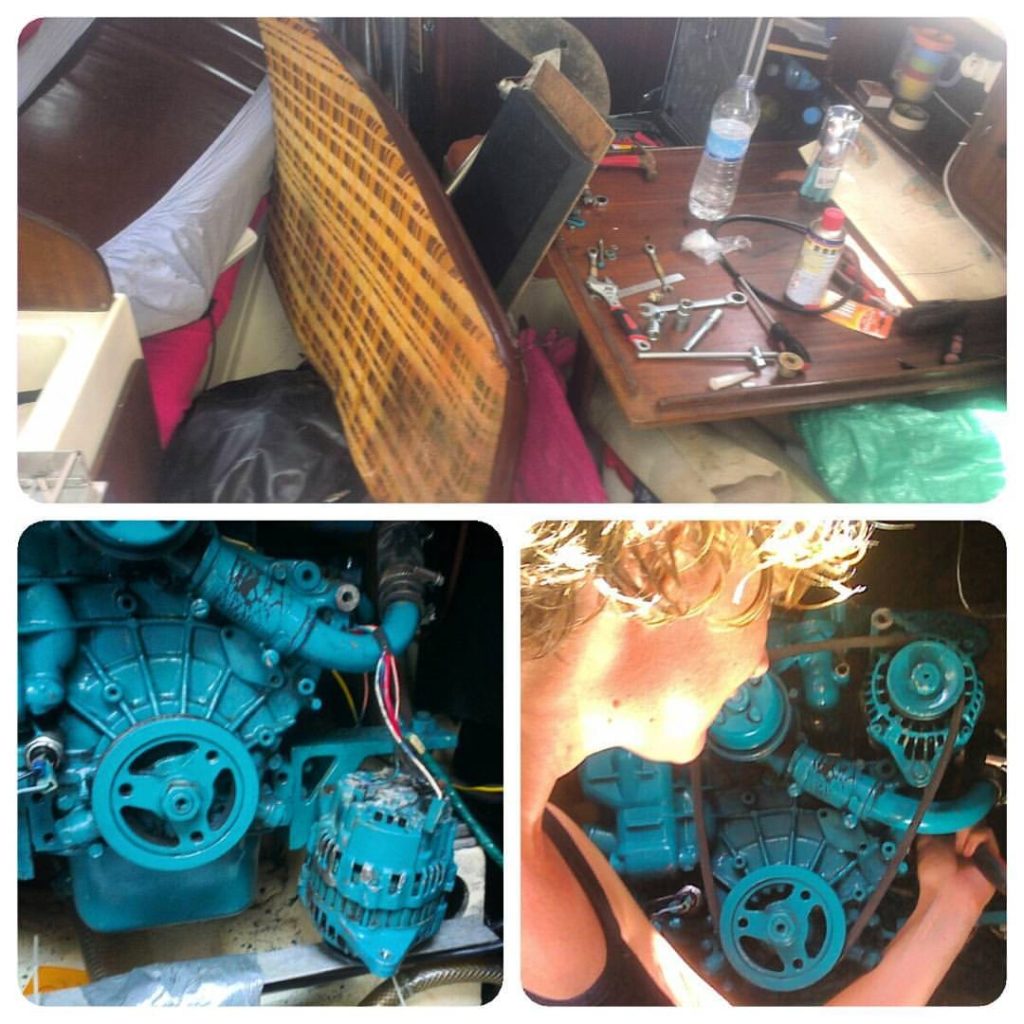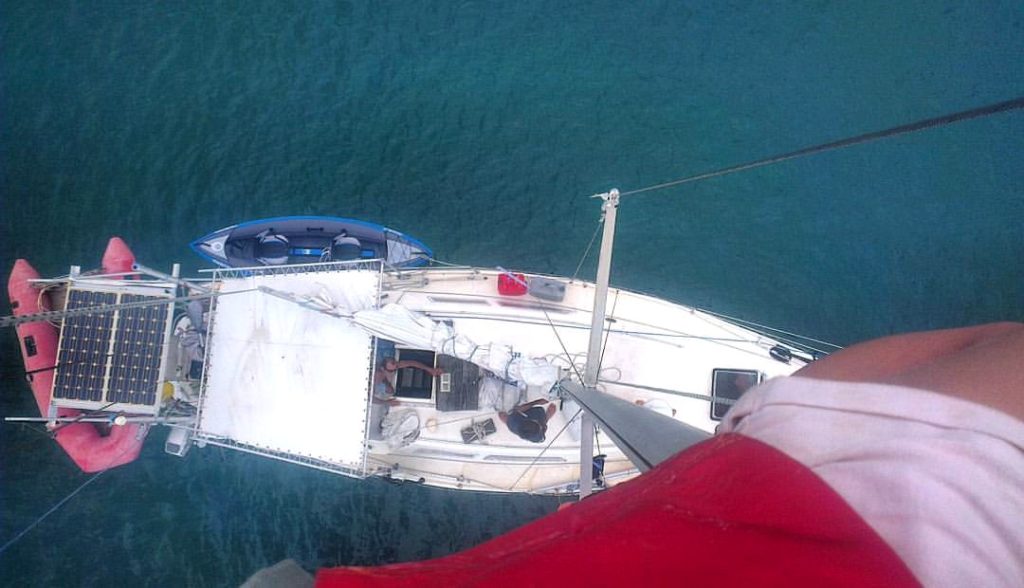I’d bought my bateau because I wanted to learn how to sail. Seems like a simple idea, right? Many people are advised to start off in a sort of apprenticeship mode, learning the ropes (literally) on other people’s boats. Take some courses, spend time seeing how it’s done with the experts before sinking a load of cash and putting yourself in danger. But I’d spent a month on someone else’s boat and had come away feeling totally useless and frustrated. I knew this route wasn’t going to work for me because of a fundamental personality issue. I realised I wasn’t someone who was good at taking the initiative (a number one rule in sailing is you don’t take the initiative; the skipper tells you what to do – but this isn’t quite what I’m talking about). But my style – sit back, observe until I feel comfortable in the situation and follow the lead of others, didn’t work. People thought I didn’t want to learn, or wasn’t able to. I couldn’t assert myself in a situation that was still new to me: at that time that just wasn’t how I operated. I realised that to learn properly, I would need to have no choice. I needed all the responsibility. Actually, I found out recently that this is a path a lot of women take – sometimes the opportunities to crew for other people aren’t that appealing. In a male-dominated sport/lifestyle, crewing websites sometimes feel like covert (and very creepy) dating sites, and it’s never that pleasant to feel like the +1 female in any situation. ‘Boater’s girlfriend’? – vomit. Plus, I like to be a leader (or maybe I’m just a control freak – more on that later) and I like having my own territory. A powerful instinct told me that this was how I needed to do it.
But although I’d already taken an RYA Day Skipper qualification, in reality I wasn’t at all prepared for what was to come. You simply can’t do it alone. A new sailing friend told me I just needed to take out Annie B by myself and just try and figure things out. But I wasn’t ready for this. I didn’t even know how to get out of the marina without damaging everyone else’s shiny-looking hulls (one sailing instructor’s advice for manoeuvring around other boats was – imagine you have to explain each decision followed by ‘Your Honour’, because rest assured those guys are going to have expensive lawyers to hand). I couldn’t be autonomous. I needed help. With everything.
It didn’t take me long to start making friends who knew
how to sail, and these people have proved invaluable to my progression. I’m intensely
grateful to them. There’s the Zen Master, who gave me my first boat-buying advice
and came all the way from Guadeloupe to help me out. There’s the Swedish Boat
Mafia, who later came to my marina on the other side of the island to help me
learn how to get out of my berth and reverse round a corner marina, as
well as practise anchoring techniques. There was Moustache, who later motivated
myself and other boat newbie friends to venture out of the marina each weekend
for a Sunday sailing club. He also regularly trains up young crew and encourages
the young people he knows to take part in regattas, always pushing us out of
our comfort zones with kindness and confidence in our abilities.

Photo credit: Kurt Andersson
The ‘sailing friends’ technique got off to a rocky start, however. My colleagues at school were all very impressed that I’d gone and bought a boat. I was très courageuse. Either I’d mentioned that I needed help, or one colleague brought it up herself. Anyway she was very proud of her son who was a sailor and knew all about boats. How about he take me out one day? This sounded perfect, so we got organised. I arrived early and prepped the boat as best I knew how (basically I did nothing), waiting for this guy to show up. When he did arrive, he looked like a child to me. Probably about 22 (at 31 I was starting to feel old). He was nervous and sweaty, which didn’t make me feel particularly at ease, but we got on with it anyway. My neighbours stood by not looking too impressed, anxious for their own boats and shouting instructions at us as we started the motor and made a total mess of getting untied from the complicated docking system they have in place in Marin. The lad was clearly mostly looking for me to lead, and I had been expecting this of him because he was the apparent expert. It was stupid, really. I’d invited him along, fully expecting him to know what to do and do all the work, not being prepared to take any responsibility myself. Anyway, I’d already done a little trip out with Monsieur M—- so I decided we would follow the same route. The guy wasn’t confident enough to get the sails out, and eventually we went and illegally anchored on some coral (me with no actual concept of how to anchor). He dived to have a look at how we’d done, and I’ve no idea if we’d actually hooked on anything. At any rate we didn’t stay long because the whole experience was EXCRUCIATINGLY AWKWARD.
I soon realised that this was a blind date (because his mother obviously thought we were a similar age, being that language assistants usually are about 22). This explained his nervous sweats. He was clumsily trying to flirt with me, and all I wanted to do was learn how to use my damned boat. After what felt like an eternity of this nonsense, we headed back and found the motor was making extremely weird noises. It had been a bit temperamental on the way out, but I’d shrugged it off because I knew nothing and we were still moving at least. But it was getting harder and harder to manoeuvre and the boy was getting more and more stressed out. I have no idea how we got back into the spot but I do remember lots of shouting and rope-throwing on the part of my neighbours, and the kid didn’t stick around for long after. I offered him a drink to say thank you, but he just took my number and proceeded to relentlessly hit on me from a distance after that. The whole situation was mortifying, not least because of the very non-responsible decisions I (didn’t) make, but also because I was outraged my colleague had thought I’d be a good match for her post-pubescent offspring (don’t worry, I’ve since got over my fear of fresh-faced youth. Love knows no age, right?)
This experience made me a little bit more wary about accepting help after that. Apparently being a single woman with a boat increases your attractiveness by at least 300%. But pretty soon I needed help again because my willingness to pay for my marina spot had expired, and I needed to move to a mooring ball. The next helper, with no difficulties whatsoever, manoeuvred me out of my berth and brought the bateau to her new home. Not wanting to leave my annexe lying around at the dock waiting to be nicked, I next shamelessly used Tinder to meet people with access to a dinghy so I could get out to do my engine work (I’d also bought an inflatable kayak, but the Tinder method was much less effort). See, I’d known there was some kind of issue with the engine already because Monsieur M—- had ordered a new part for it from France. I didn’t actually know what this part was, but I confidently decided this had been the root of our dodgy exit and re-entry, so when it arrived in the post, I got my manual out and set to dismantling the engine. I had to dismantle things because there seemed to be no other way to access the part to be replaced, but a few hours later I was crying with the impossibility of unscrewing things that seemed to be painted into place. I was not feeling like a cool independent woman any more. Plus everything was leaking and I could see my to-do list stacking up to infinity. There was a British-flagged vessel anchored just behind me, so I shouted over for a bit of help (I wanted to borrow tools, but he was really just going to come and do it for me). A very grumpy old guy came over and sweated and swore at me, calling me a stupid girl and all sorts of things. We replaced the thermostat, which was what the part turned out to be, and as anyone who knows anything about diesel engines will tell you, this was obviously not the cause of my dodgy gearbox issue.

By now I had realised that my boat was not in the top shape Monsieur M—- had led me to believe it was, but we were going to have to muddle through because my contract at school was ending and I was going to be heading back to Europe soon. Annie B needed a safe place to sit out hurricane season, and since I didn’t know anyone else in Martinique, I called up Zen Master in Guadeloupe for help. He looks after a number of people’s boats in his marina and in exchange rents them out on Airbnb and Couchsurfing for a bit of income. Despite the fact that Guadeloupe is a much riskier hurricane season prospect than Martinique, the marina was extremely cheap and having a friend watch over things seemed like a really good option. We arranged a date for him to come and join me, and I sweated over the list of things he had told me needed to be ready before he came. (I suppose for him it went without saying that the engine needed to be working.) But anyway I had other big problems on my hands because I needed to organise insurance (and I’d shot myself in the foot by changing the boat’s registration to British, the French companies I gallantly tried to negotiate with didn’t want to know) and there was a serious fuel strike in Martinique, making the logistics of getting to and from the boat in a car-sharing situation very complicated.
At this point a knight-in-shining-armour from the Swedish Boat Mafia came onto the scene, and gave me the encouragement and support of a genuine friend that I really needed. I had several really pressing things I needed to deal with. First of all, we launched my dinghy so I could stop using Tinder for rides. Unfortunately the outboard (which, at 30kg, was too heavy for me to lift on my own anyway) didn’t start and so my friend performed some very generous taxi services, as well as guiding me on how to get the repair sorted. He next helped me move the boat to an anchorage in a clean bay round the corner, and instructed me to don a wetsuit and clean my hull. That day started in a burst of optimism and enthusiasm and quickly degraded into tears and trauma. I’d never scraped a hull before. I wasn’t very good with a snorkel mask, I didn’t wear diving fins, nor did I think to put on gloves. At first it looked like I had a forest growing under there, but later on deforestation revealed my own personal coral reef. I couldn’t master holding my breath or staying under the hull for any length of time, and my diving was atrocious. I used all my available daylight hours on a dive, scrape, gulp for breath, cough up seawater sequence. By sunset I was bloody and shaking, but the hull was clean. My bateau would probably now make it to Guadeloupe, engine issues aside. Hurray!
Yes, those engine issues hadn’t magically vanished with the changing of the thermostat. A friend of mine had volunteered to be the third crew on the trip to Guadeloupe, so she showed up the next day for a training sail with my Swedish friend as we got the boat back to its mooring in Marin. He was kind and patient with us, and I was awash with pride because this was my first actual time sailing with Annie B since the sortie with Monsieur M—-. I felt a tiny bit more confident, but all this evaporated as the engine started doing its thing just as we had to manoeuvre in a tight space to get back onto the mooring ball. My friend was a bit angry and stressed out, and I could see he was very much regretting some of his decision to help. It seemed like my boat had that effect on people. But the time for fixing things had run out, as we’d planned a short trip to Grenada in his boat before Zen Master was due to arrive for the bateau’s last voyage of the season.
Since my Crew was handling provisioning, I reassured Zen Master that as far as I was aware, we were prepped and set to go. We took a trip out to the mooring with a couple of his young friends who’d wanted to visit, and he assessed the situation. He quickly saw that the jib sail was rigged very weirdly, and that a trip up the mast was necessary. He turned to me to give me some of my first lessons in taking responsibility for my own boat. This was my job. A 16-year-old girl who was crewing on someone else’s boat had recently died when the captain had sent her up the mast. He’d never be able to live with that guilt. As captain, this was my responsibility, and I was to tie my own bowline knot to make sure I really was taking my life into my own hands. It took the two guys to winch me up the mast (as, surprise surprise, the winch was crap) and I was crying tears of fear, not just because of the height but because how could I trust my knot, and this flimsy rope? I clung to the mast as it swayed nauseatingly, hands shaking as I tried to followed Zen Master’s French instructions that I didn’t quite understand, shouted from below. I wanted to die. (But I did get a really good photo.) We only had 1 more day until departure time, so we ticked off our remaining to-do list items and, stressed out of my tree, I got myself ready to leave for Anne Bonny’s first big adventure.

The moral of the story
For anyone starting out with a boat for the first time (especially if you’re doing it alone), the most important thing is not to let pride or over-confidence get in the way of asking for help. Sailing and boat ownership is a really weird thing. They let literally anyone do it. People always ask me – do you have your license? What license? I reply. There is no license required for galivanting around with a lot of toxic fibreglass potentially crashing into other people or fouling up the delicate marine ecosystem. You take responsibility for this expensive and dangerous machine and you can easily fuck everything up. (Remember that couple who crashed into the rocks on leaving port right at the very start of their trip? And then crowd-funded so they could buy another boat and do it again?) Know your limits, guys! I didn’t take my friend’s advice and go out solo at the start because this wasn’t a little Optimist on a lake. I did a Day Skipper course in the UK, which in reality didn’t prepare me at all for taking my own broken piece of shit out. Then I heavily relied on the kindness of sometimes near strangers to learn the responsibilities of a boat owner and make my first tentative outings. Without these people I would have been totally lost (or probably, dead). I send them my sincerest thanks.
P.S. 3 years on from this episode, I have now sold my dearest Anne Bonny. We had some incredible adventures together and I eventually felt confident enough to go out sailing first with crew, then by myself. I got a bit handier with repairing all my things, took further training to gain RYA Coastal Skipper, and then felt like I was finally ready to go and apprentice myself, learning the ropes on other boats. I’m learning far more now than I might have done without this crash course in boat ownership, and have been equipped with a sense of responsibility that I hope will serve me well if I ever make it to become a professional skipper. I wouldn’t have traded the Anne Bonny disaster training school for anything in the world.



I wasn’t angry.
Slightly irritated perhaps….
😉
Wow! That was all a lot more traumatic then we realized at the time. Well done you for persevering!